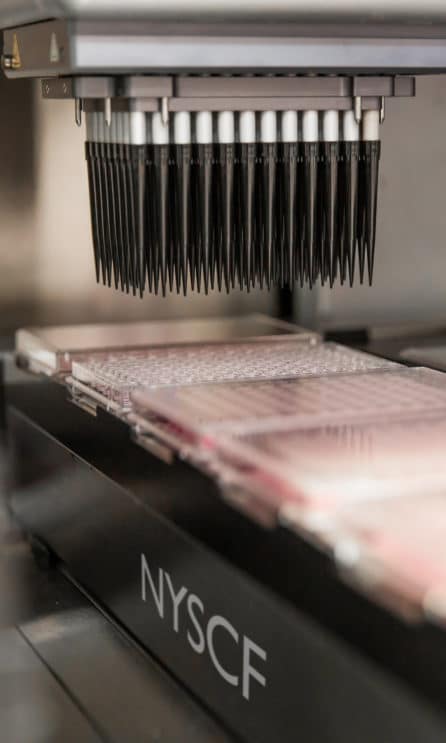Partnering & Alliances
At NYSCF, we collaborate with a broad range of leading academic institutions and research centers, forward-thinking foundations, and innovative companies across the globe. Our partnerships and collaborations take various forms to accelerate the path to successful future therapies. Leveraging NYSCF’s large-scale automation technology, these partnerships can encompass everything from the genesis of vital research resources, such as large iPSC cohorts for specific disease areas and in vitro human disease models, to developing and conducting high-throughput drug screening assays. Please see below for details and examples; we welcome your inquiries about these or other partnering opportunities.
High-throughput, automated generation of iPSC lines and derived cell types
NYSCF is a preferred partner for gold-standard, automated generation of iPSC lines and derived cell types, in academic, non-profit, government and industry collaborations. The NYSCF Global Stem Cell Array®, our cell culture automation technology, eliminates manual manipulations to reduce technical variability and maximize reproducibility, yielding a repository of thousands of iPSC lines from genetically diverse patients and healthy populations spanning 300 diseases and conditions. Recent partnering examples include:
- Simons Foundation for the study of autism spectrum disorder
- Johns Hopkins University Precision Medicine Centers of Excellence for rare and complex diseases
- NIH/NEI for age-related macular degeneration (AMD AREDS2 iPSC lines) and NIH/CARD to study Alzheimer’s

Collaborative disease modeling efforts
NYSCF’s expert scientific, technical, and clinical teams work together with leaders in the field to develop advanced human models of disease at population scale that capture patient heterogeneity, with the potential to transform traditional disease research and drug discovery. Examples of impactful, collaborative disease modeling projects include:
- First iPSC model of PTSD reveals hypersensitivity of neurons to stress (Seah et al., Nature Neuroscience 2022)
- Alzheimer’s hallmarks recapitulated in iPSC-neurons (Lagomarsino et al., Neuron 2021)
- Unveiling drivers of genetic and idiopathic Parkinson’s Disease (read more)
- Understanding genotype-phenotype relationships in type 2 diabetes, in collaboration with Dr. Francis Collins at NHGRI
- Increasing industry collaborations in iPSC-powered drug development for retinal, cardiac, neural, and rare diseases
These and many other projects leverage our optimized and largely automated protocols for differentiating pluripotent stem cells into disease-relevant cell types, including neuronal, glial, pancreatic, cardiac, hepatic, retinal pigmented epithelial, cardiomyocytes, and immune cells. As 3D cultures, we have also established automated protocols for differentiations into neural and pancreatic organoids, and efficient methods for deriving ovarian cancer organoids from tumor resections.
AI-based high-throughput screening of various therapeutic modalities
We combine high-throughput screening, artificial intelligence, and multi-modal assays to discover novel disease phenotypes, druggable targets, and therapeutic candidates. Our technology is capable of screening large libraries of small molecules and other therapeutics. Partnering example:
- Identifying novel cellular phenotypes of complex diseases, demonstrated in Parkinson’s patient fibroblasts, to enable target-agnostic drug screens (Schiff et al., Nature Communications 2022)
If you are interested in collaborative opportunities with NYSCF, please contact partnering@nyscf.org.


